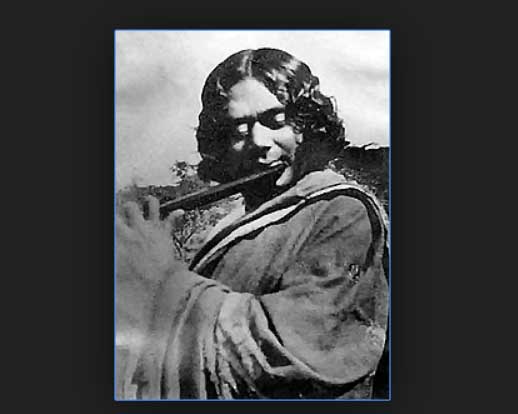
‘I sing the song
Of equality :
In my view gender difference
is essentially a triviality.
Everything that is great in the world,
all the works, beneficial and good,
half must be credited to woman,
and to man, half only we should.
(Original: ‘Nari’ ( Bengali)
Translator : Mohammad Omar Farooq )
PoemHunter.com
This is a reflection of Kazi Nazrul Islam’s deep concern for women and their suffering. His works are very relevant even to this day as they contain burning issues of human oppression and exploitation.
History
Kazi Nazrul Islam was a Bengali poet, writer, musician, anti- colonial revolutionary and the national poet of Bangladesh. Popularly known as Nazrul, ( 24 May 1889 – 29 Aug 1976) , was born in the village of Churulia , Asansol Sadar, Paschim Bardhaman, district of Bengal Presidency ( now West Bengal, India). He worked as a muezzin in a mosque for some time. He learned about poetry, drama and literature while working with a rural theatrical group ‘ Letor Dal.(wikipedia.org). He joined British Indian Army in the middle east( Mesopotania campaign) in 1917, left it in 1920 and settled in Calcutta as a journalist. He called for revolution and criticized British Raj by his poetic works like ‘Bidrohi’ (The Rebel) and ‘Bhangar Gaan’ ( The song of destruction) and his publication ‘Dhumketu’ ( The comet). While he was imprisoned due to his activism in Indian Independence movement, he wrote ‘ Rajbandir Jabanbandi’ ( Deposition of a Political Prisoner).
Versatility
He was a versatile artist who wrote and composed music for over 4,000 songs called ‘ Nazrul Geeti’. His works inspired war of liberation of Bangladesh. His works include ‘ Mrityukshuda’ and ‘Bandhan Hara’. He also wrote short stories and novels but he is mainly remembered for his ghazals in bengal language. He experimented using Persian, Arabic and Sanskrit words.
His works exposed oppression in society and he wrote against bigotry, fundamentalism, caste – based discrimination, freedom and humanity.
The rebel poet
His political activism and struggle for social justice earned him the title ‘Bengali: Bidrohi Kabi’ ( The Rebel Poet). At the age of 43, he was diagnosed with a rare disease that had a great affect on his memory and lost his voice. He lived in isolation in India and was even admitted to Ranchi hospital. In 1972, on the invitation of Bangladesh government, his family moved to Dhaka where he passed away four years later. He was awarded Padma Bhushan in 1960. His poems and songs are popular even to-day.
‘……
‘I am the rebel eternal
I raise my head beyond this world
High, ever erect and alone!
The Rebel
Translator : Kabir Chowdhury
( Poemhunter.com)
The writer from everywhere and anywhere supports human values










































